Timothy Hughes – sharing his passion for collecting historical newspapers…
October 10, 2022 by GuyHeilenman · Leave a Comment
Tim Hughes has had multiple opportunities to speak about his love for Rare & Early Newspapers. Whether it has been in front of teenagers in Pennsylvania or adults in California, it is especially rewarding when he shares his hobby to those from his own town. He recently had the privilege to do so at the local historical society (Thomas T. Taber Museum) in Williamsport, PA, which was reported in the Williamsport Sun-Gazette. Please enjoy:

The End of an Era at Rare & Early Newspapers… Thanks Mike!
September 29, 2022 by GuyHeilenman · 3 Comments
 For nearly 20 years we were blessed to have Mike Hiller as an “active member” of our Timothy Hughes Rare & Early Newspapers family. His sense of humor delighted us daily, his attention to detail was second-to-none, and his work ethic and commitment to excellence were an inspiration to all who had the privilege of working with him. If you purchased a newspaper from us during his reign as “Warehouse Supervisor and Shipping Extraordinaire” you likely had a chance to see his handiwork. While he certainly made all of our lives easier, his greatest contribution was in his unofficial capacity as “Exemplary Role Model of Guy and Laura’s Children” – a task he took quite seriously. The top photo is of Mike taken on his last day of work, and the one shown below is of him with each of our kiddos – all who benefited from his example (he’s the one in the middle).
For nearly 20 years we were blessed to have Mike Hiller as an “active member” of our Timothy Hughes Rare & Early Newspapers family. His sense of humor delighted us daily, his attention to detail was second-to-none, and his work ethic and commitment to excellence were an inspiration to all who had the privilege of working with him. If you purchased a newspaper from us during his reign as “Warehouse Supervisor and Shipping Extraordinaire” you likely had a chance to see his handiwork. While he certainly made all of our lives easier, his greatest contribution was in his unofficial capacity as “Exemplary Role Model of Guy and Laura’s Children” – a task he took quite seriously. The top photo is of Mike taken on his last day of work, and the one shown below is of him with each of our kiddos – all who benefited from his example (he’s the one in the middle).
Mike,
We pray you and your wife will thoroughly enjoy this next chapter of your lives – the so-called “retired phase”. Thank you for being you.
With love and respect,
Guy & Laura Heilenman
Although we are saddened to see this era come to an end, we are grateful Mike has agreed to accept a new position: “Occasional ‘Special Projects’ Guru”. The Rare & Early Newspaper’s world is not ready to cut the ties that bind.
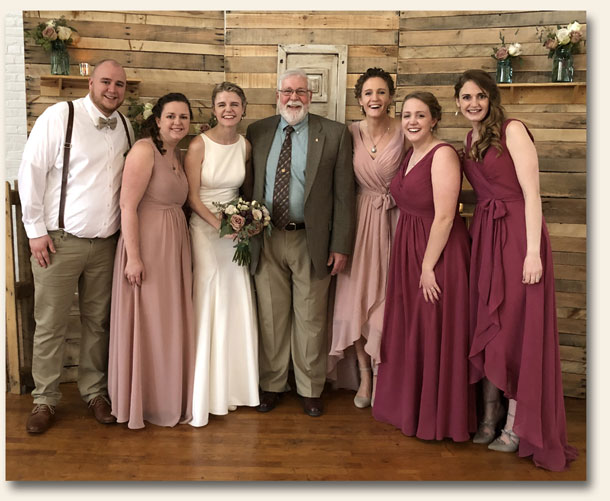
Journalism from Early America to the Digital Age… Election Fraud and more…
June 10, 2022 by GuyHeilenman · Leave a Comment
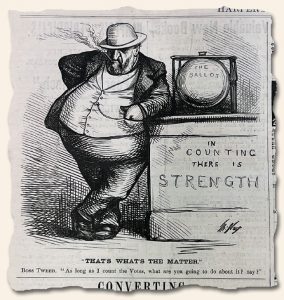 Someone recently brought to my attention an article posted on the website “Brewminate: A Bold Blend of News and Ideas”. While scanning the article I was intrigued by the presence of illustrations of newspapers we have or have previously offered. One in particular which caught my attention was the timely political cartoon by Thomas Nast found in the Oct. 7, 1871 issue of Harper’s Weekly. While a degree of election fraud is (unfortunately) part-and-parcel of the election process, I was inspired to read through the entire article, and in so doing, found it to be quite informative… and wondered if the friends of Rare & Early Newspapers might also find it interesting. Hopefully you will also enjoy reading it:
Someone recently brought to my attention an article posted on the website “Brewminate: A Bold Blend of News and Ideas”. While scanning the article I was intrigued by the presence of illustrations of newspapers we have or have previously offered. One in particular which caught my attention was the timely political cartoon by Thomas Nast found in the Oct. 7, 1871 issue of Harper’s Weekly. While a degree of election fraud is (unfortunately) part-and-parcel of the election process, I was inspired to read through the entire article, and in so doing, found it to be quite informative… and wondered if the friends of Rare & Early Newspapers might also find it interesting. Hopefully you will also enjoy reading it:
“Journalism from Early America to the Digital Age”
Memorial Day – How many generations does it take to… (?)
May 27, 2022 by GuyHeilenman · Leave a Comment
Generation 1 – The Call to Sacrifice
The oppressed are willing to sacrifice their very lives to throw off oppression – and many of them do, giving their last breath for the sake of their children and their children’s children.
Generation 2 – Picking Up the Pieces
Those recently freed from oppression begin to reap the rewards of their new freedom, but many scars remain – particularly those caused by the loss of loved ones.
Generation 3 – Enjoying Freedom’s Bounty
The sacrifices of the past are still discussed, but the wounds are largely well-healed, and the benefits born of the sacrifice of others is fully embraced.
[an unspecified number of generations – usually not many]
Generation End (Minus 2) – Freedom Is & Always Will Be
Freedom is so commonplace, it begins to be taken for granted. The oppression and sacrifices of the past are long forgotten.
Generation End (Minus 1) – Heads in The Sand
Freedom, is it really all that important? Comfort and ease is what we want. Sacrifice? For what! A blind eye is turned to the new oppressors at the gate.
Generation End – The Demise!
Where did our freedom go? Why are we being oppressed?? How did this happen???

Memory – it’s indispensable. A simple internet search for “lest we forget”, “those who fail to remember”, or similar will return a plethora of warnings about the consequences which go hand-in-hand with not remembering the lessons, sacrifices, blessings, etc. of the past.
As an example, it would be hard to argue that the Jews/Israelites, through time, have been one of the most oppressed people-groups on the planet – a chain of horror which began with their enslavement in Egypt. One would have thought their eventual “deliverance” by the hand of God would have set them up for eternity, yet, just a few generations after their new-found freedom was realized, they found themselves enslaved once again. Why? “The Israelites failed to remember the LORD their God who had delivered them from the hands of all their enemies on every side (Judges 8:34).”
While each generation needs to take personal responsibility for “remembering”, one cannot remember that which one never knew. Therefore, we, as the current generation, must take ownership of teaching ourselves, keeping what we learn in the forefront of our minds, and then teaching the next generation – lest they never know. Will this take considerable effort? Sure, but the sacrifice of time and energy pales in comparison to the sacrifices of the past.
To this end, perhaps the following will be useful:
Previous Memorial Day Themed Posts
Memorial Day Themed Newspapers
PS I am grateful for the men and women who have given their lives so my family, friends, and neighbors, whether we be politically or philosophically divergent or parallel, can enjoy the freedoms which fall under the umbrella of “inalienable Rights which are endowed to each one of us by our Creator”.
Popular Categories – A Deeper Dive into the Legacies of U.S. Presidents…
May 9, 2022 by Laura Heilenman · Leave a Comment
Most people have their favorite President of the United States. I’m sure if we each came up with our short list of five favorites there would be considerable overlap. Washington, Lincoln, Ronald Regan or Barack Obama (depending on which side of the isle the person resides), etc. – each president, popular or otherwise, has their own fascinating history which often includes failure, success, and often a few quirky tidbits of fun facts. The wonderful thing about original newspapers is they give collectors the ability to dig into the more obscure details of the lives and legacies of each of these once-upon-a-time “leaders of the free world”. In fact, newspapers containing such mentions are so sought after, we have a dedicated link on our website to help with the exploration: Presidents (U.S.)
As I began perusing collectible issues related to this post my attention aroused by an interesting story regarding our 37th president, Richard Nixon. To counter-act the ever-growing tension which plagued the latter years of his administration – both Watergate and the “resignation” of his VP, Spiro Agnew, President Nixon nominated a replacement for Agnew whom he knew would be easily and quickly confirmed, but who also believed in his innocence in regard to Watergate – one who would likely pardon him if the need arose. President Gerald Ford, after taking the oath of office upon Nixon’s resignation, did in fact give him an unconditional pardon for any and all crimes he may have committed against the United States. Although this particular use of a Presidential pardon has only occurred once in U.S. History, now that the box has been opened, it likely won’t be the last.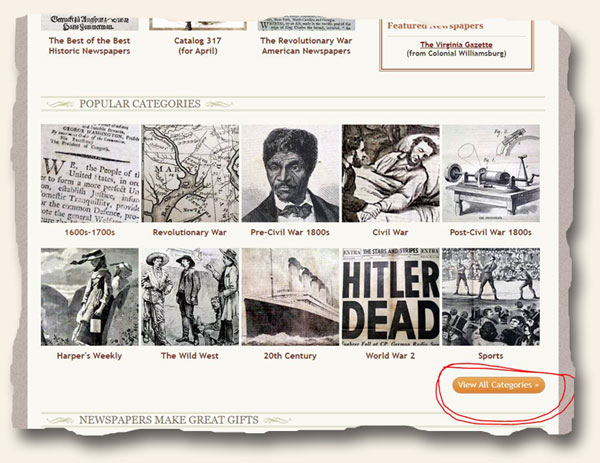

From the Library of Congress: “Printing Newspapers 1400-1900: A Brief Survey…”
May 2, 2022 by GuyHeilenman · Leave a Comment
 A friend of Rare & Early Newspapers recently sent us a link to an article posted on the Library of Congress’ blog titled, “Printing Newspapers 1400-1900: A Brief Survey of the Evolution of the Newspaper Printing Press” (written by Joanna Colclough and posted by Malea Walker), which we thought was quite interesting. It begins in part:
A friend of Rare & Early Newspapers recently sent us a link to an article posted on the Library of Congress’ blog titled, “Printing Newspapers 1400-1900: A Brief Survey of the Evolution of the Newspaper Printing Press” (written by Joanna Colclough and posted by Malea Walker), which we thought was quite interesting. It begins in part:
“The printing press has always been a marvel of human invention, and the printing of newspapers occupies a unique course in the history of printing machines. As demands grew for more pages, more news, and faster delivery, newspapers had to achieve greater speeds and higher efficiency.
Newspapers started on Gutenberg presses – individual type pieces arranged backwards by hand, secured in a flat bed, inked by hand, and a great leverage force applied to create the impression. The machine did one part of the job, and newspapers were often printed once a…”
To read the entire post, go to:
Printing Newspapers 1400-1900: A Brief Survey of the Evolution of the Newspaper Printing Press
Edward Gallaway – bibliophile, publisher, circus performer, cardshark – help needed…
April 25, 2022 by GuyHeilenman · Leave a Comment
A collecting friend is doing research on Edward Gallaway (1868-1930). Perhaps the collecting community can help. He sent the following note:
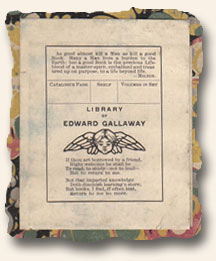
You can help a research project into a largely unknown bibliophile from Chicago, Edward Gallaway, by checking if you have any of the following in your collection:
1) Anything with the bookplate shown in the image.
2) Any issue or clipping from the Payne Weekly People, published in Fort Payne Alabama in October of 1889. This weekly newspaper, published by Edward Gallaway, discontinued roughly a year later end of 1890. This town experienced a boom during those years and many investors hailed from Massachusetts. Thus issues may have been transported back to the New England region.
3) Any issue from the Fort Payne Journal before 1891.
4) Any issue from the Fort Payne Herald.
5) Any issue from the Delphos Kleeblatt before 9th May 1891. The Delphos Kleeblatt was a German newspaper out of Delphos, Ohio, published by Carl A. Jettinger, who was a friend of Edward Gallaway.
Edward Gallaway had a fascinating life. He was born in Delphos, Ohio, in 1868. Already with 14 he became a printer’s devil at the local Delphos Weekly Herald newspaper, where he learned the printer’s art. From 18 years old to 21 he worked as a traveling typesetter. Eventually, he followed his older brother Alexander August Gallaway to Fort Payne, Alabama, where he established the short lived Payne Weekly Newspaper during the coal and iron boom years there. After the boom collapsed, Edward completely changed course and he became a circus performer working from 1892 until about 1895 at small traveling circuses such as the W.D. Ament sideshow. He performed mostly under the stage name Prof. Charles P. Wilson. His act consisted of Punch and Judy as well as magic. He would also work as barker, canvass boss man, as well as sideshow manager.
Edward Gallaway had a secret life as a cardshark. Later in 1902 he would write a manual of sleight-of-hand with cards educating readers on cheating at the card table as well as how to perform magic card tricks. This book, The Expert at the Card Table, was published under the pseudonym S.W. Erdnase, and it is to this day the most important book on sleight-of-hand with cards. It was decades ahead of its time.
Eventually, he found back to his printing profession and he started either alone or with others various job printing business, all of which were short lived. Around 1900 he is employed by the Bentley Murray printing company where he honed his skill on the Monotype typesetting machine which lead him to write the Monotype System books and other educational matter for Lanston Monotype. He started to teach estimating at the United Typothetae which brought him to the attention of Donnelley where he was later employed as estimator. There he rose up through the ranks to reach the position of director of estimating. In other words, he was the chief estimator at the largest privately owned printing company in the US. In 1925 he left and established his own School for Estimating in Chicago, the only school focusing on that particular aspect of printing. He died 1930 in Chicago.
During his life Edward Gallaway accumulated a large library with many precious books which his wife after his death sold through Chicago second-hand book dealers. This was the ‘pension’ she lived on until her death in 1943.
If anyone can be helpful in regards to this research project, please contact me (Guy) at guy@rarenewspapers.com. Thanks.
Snapshot 1864… Confederacy’s fight – for independence or slavery?
December 20, 2021 by GuyHeilenman · Leave a Comment
In grade school back in the 1960’s/1970’s I was taught that the Civil War was fought between the Northern (Yankee) States who wanted to free the slaves and the Southern States (Confederates) who wanted to keep the slaves in bondage. Bad Southerners! Perhaps if I had been born in The South my education would have been bent in a different direction, but through my teenage years I assumed this was the accepted “truth”. When I moved on to college… and then graduate school, my assumption of such a simplistic view was challenged by my enlightened (now I think they would be called “woke”) professors who informed me of the true reason: The Southern States merely wanted to exercise their right to self-government (i.e., “State’s Rights”)… to not be controlled by a federal government whose reigns were largely in the hands of the Northern States and their own interests… the right to separate (succeed)., while the Northern States wanted nothing more than to preserve The Union (largely for selfish reasons). Bad Northerners!
Of course I now know the reasons were varied and complex, but by far the most important result was in fact the Emancipation of enslaved blacks. After all, how could “We The People” possibly stand the test of time without embracing (to the core) the self-evident truth that “all [people] are created equal, that they are endowed, by their Creator, with certain unalienable Rights, that among these are Life, Liberty, and the pursuit of Happiness”?
However, I digress. Circling back to the divergent views I was taught…
As I was perusing a Sacramento Daily Union (Nov. 3, 1864), the heading of a front-page article caught my attention: “The New Agitation in the South – Slavery as Well as Separation the Ultimate Object of the Rebellion”. It turns out that while revising history to meet a specific narrative may be the order of the day, the historical perspective regarding this particle issue may not be a victim of these Orwellian efforts. The article (in full) is as follows:
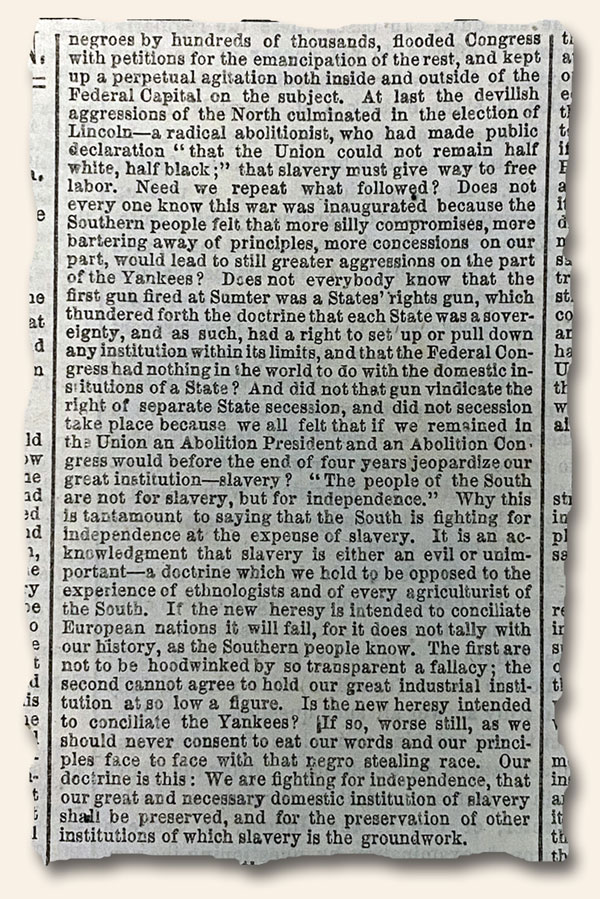
Where History Comes Alive (Part 1)… Savannah in the mid-18th century…
November 26, 2021 by Laura Heilenman · Leave a Comment
 People often say a trip to Israel brings Scripture to life as you walk in the same dust Christ did. Now that is a journey at the top of my bucket list! Until I get to check this one off, living on the East Coast gives me many similar opportunities albeit to a lesser degree. Standing on a spot where people who exuded bravery and conviction stood so many years before, is a moving and inspirational experience every time. One of my favorite locations is Savannah Ga. The Historical District has something for everyone, from history overviews and current culture to stunning architecture and sweeping landscapes. Reading stories of those 1st fearless Georgia Settlers in an APPLEBEE’S ORIGINAL WEEKLY JOURNAL dated September 15, 1733 brings the dreams of James Edward Oglethorpe to life and motivates a lover of history to embrace the challenges of their time. Moments like this help to satiate my passion to see the world until I can complete my bucket list.
People often say a trip to Israel brings Scripture to life as you walk in the same dust Christ did. Now that is a journey at the top of my bucket list! Until I get to check this one off, living on the East Coast gives me many similar opportunities albeit to a lesser degree. Standing on a spot where people who exuded bravery and conviction stood so many years before, is a moving and inspirational experience every time. One of my favorite locations is Savannah Ga. The Historical District has something for everyone, from history overviews and current culture to stunning architecture and sweeping landscapes. Reading stories of those 1st fearless Georgia Settlers in an APPLEBEE’S ORIGINAL WEEKLY JOURNAL dated September 15, 1733 brings the dreams of James Edward Oglethorpe to life and motivates a lover of history to embrace the challenges of their time. Moments like this help to satiate my passion to see the world until I can complete my bucket list.
Snapshot 1801… The importance of newspapers…
November 4, 2021 by GuyHeilenman · Leave a Comment
In 1803 the well-respected Columbian Centinel and Massachusetts Federalist dated August 19, 1801 printed an article affirming a new publication, the Country Gazette of the United States (Philadelphia), and made a powerful statement regarding the importance of newspapers which we have shown below. This declaration is reflective of new president Thomas Jefferson’s comments regarding newspapers from back in the late 1780’s:
“The people are the only censors of their governors: and even their errors will tend to keep these to the true principles of their institution. To punish these errors too severely would be to suppress the only safeguard of the public liberty. The way to prevent these irregular interpositions of the people is to give them full information of their affairs thro’ the channel of the public papers, & to contrive that those papers should penetrate the whole mass of the people. The basis of our governments being the opinion of the people, the very first object should be to keep that right; and were it left to me to decide whether we should have a government without newspapers or newspapers without a government, I should not hesitate a moment to prefer the latter. But I should mean that every man should receive those papers & be capable of reading them.”
If either the publisher of the Columbian Centinel or Thomas Jefferson were alive today, do you think they’d feel the same? Please share your thoughts.


